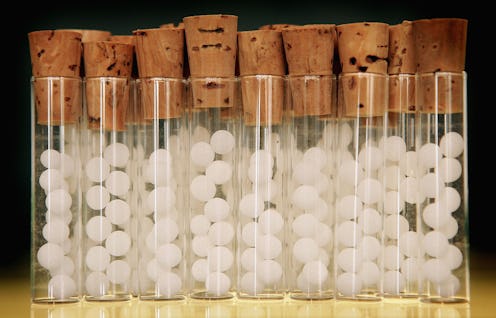
Homeopathic medicine is popular in the U.S. — millions of adults and children use homeopathic medication every year, and it's evolved into a $3 billion industry. But some scientists worry that homeopathy can do more harm than good, and the U.S. Food and Drug Administration (FDA) seems to agree. The FDA will start cracking down on "potentially harmful" homeopathic remedies, according to a statement released Dec. 18. The FDA says it will prioritize regulating drugs that could potentially harm patients. This includes medications that have safety concerns, potentially unsafe ingredients or that are aimed at "vulnerable populations." Also included: Products that aren't taken orally or topically, and homeopathic medicines that are marketed toward life-threatening conditions, like cancer or heart disease.
It's a decision that's been in the works for nearly three years; the agency announced its plans to change homeopathic regulations in March 2015. FDA Commissioner Scott Gottlieb, M.D. said in a statement that the agency has seen a "large uptick in products labeled as homeopathic that are being marketed for a wide array of diseases and conditions, from the common cold to cancer."
"In many cases, people may be placing their trust and money in therapies that may bring little to no benefit in combating serious ailments, or worse – that may cause significant and even irreparable harm because the products are poorly manufactured, or contain active ingredients that aren’t adequately tested or disclosed to patients,” Gottlieb said.
Homeopathic medicine is rooted in the belief that your body can heal itself, and it dates back to the 1700s, according to WebMD. Homeopathic medication often contains a low dosage of an active ingredient because practitioners believe dilution actually makes medication more potent, according to the National Center for Complementary and Integrative Health.
The National Center for Homeopathy released a statement in response to the FDA's announcement, saying it "supports the FDA’s efforts."
"We are committed to working with industry partners to protect consumer access to homeopathic medicines, and we are hopeful that this action will not impede access," the statement reads. "Homeopathic medicines are safe, gentle and effective when products are manufactured in accordance with HPUS (Homoeopathic Pharmacopoeia of the United States) guidelines under CGMPs (Current Good Manufacturing Practices). We welcome the opportunity to educate consumers and healthcare professionals about the unique aspects of homeopathic medicine."
The press release says the agency has noticed an increase "poorly manufactured products that contain potentially dangerous amounts of active ingredients. In April, the FDA issued a recall for homeopathic teething tablets after discovering that they contained belladonna, a substance the agency claims shouldn't ever be ingested by children under two years old.
So what does this mean for a person who occasionally uses homeopathic medicine? Unless it falls into one of the categories listed above, it's likely that nothing will change in the immediate future, but even medications not included in this crackdown could eventually be at risk. The agency says "many homeopathic products [...] will remain available to consumers," but the FDA hasn't ruled out adding more regulatory rules to the homeopathic market. The FDA says the growth of the industry "exposes more patients to potential risks associated with the proliferation of unproven, untested products and unsubstantiated health claims," according to a press release.
“Our approach to regulating homeopathic drugs must evolve to reflect the current complexity of the market, by taking a more risk-based approach to enforcement," Gottlieb said in the release. "We respect that some individuals want to use alternative treatments, but the FDA has a responsibility to protect the public from products that may not deliver any benefit and have the potential to cause harm.”
Janet Woodcock, M.D., director of the FDA’s Center for Drug Evaluation and Research, said homeopathic products "may not meet modern standards for safety, effectiveness and quality."
“The draft guidance is an important step forward in the agency's work to protect patients from unproven and potentially dangerous products," she said in the release.
It's not yet clear how this will change the homeopathic industry in the long run, but the FDA's commitment to this crackdown means [regulations for homeopathic remedies will likely be enforced much more stringently than they have been. It'll be interesting to see what this actually means for homeopathy — and if practitioners will eventually fight the regulations — but it'll be a while before we know what'll actually happen.